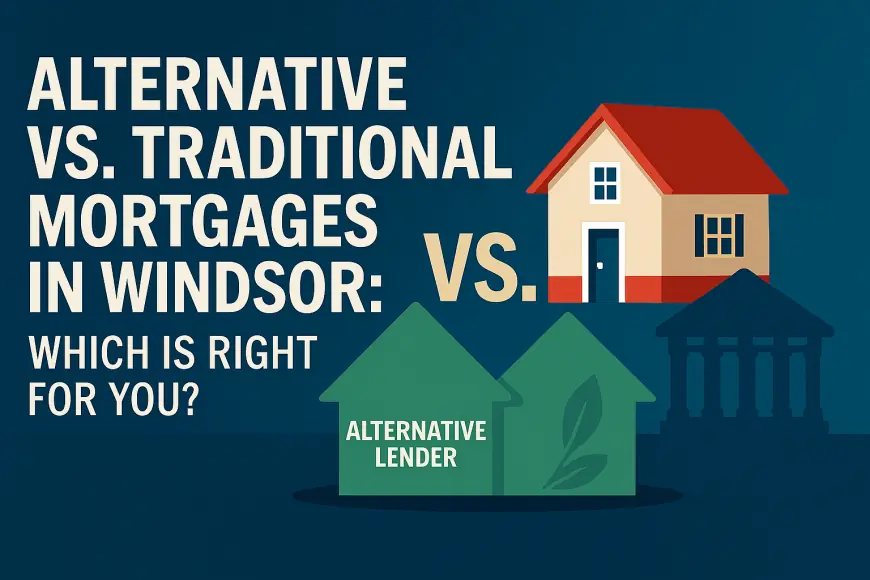Alternative vs. Traditional Mortgages in Windsor: Which is Right for You?

Navigating the real estate market in Windsor can be both exciting and overwhelming, especially when it comes to choosing the right type of mortgage. Whether you're a first-time homebuyer or looking to refinance, understanding the difference between traditional and alternative mortgages is key to making an informed decision that aligns with your financial situation and long-term goals.
What Is a Traditional Mortgage?
A traditional mortgage typically comes from a major financial institution such as a bank or credit union. These lenders follow strict qualification guidelines regulated by government standards, including:
-
Minimum credit score (usually 680+)
-
Stable employment and income history
-
Low debt-to-income ratio
-
Down payment of at least 5% (or more, depending on the price of the home)
Traditional mortgages often come with competitive interest rates and flexible terms, but they’re not for everyone.
What Is an Alternative Mortgage?
An alternative mortgage, often provided by private lenders or "B lenders," is designed for borrowers who don’t qualify under traditional lending criteria. This includes self-employed individuals, those with bruised credit, or newcomers to Canada.
Alternative mortgages offer:
-
More flexible qualification rules
-
Higher tolerance for credit issues or irregular income
-
Faster approval process
However, they typically come with higher interest rates and shorter loan terms, and may require a larger down payment.
Windsor's Market: Why the Choice Matters
Windsor’s real estate market has grown steadily in recent years, fueled by its affordability compared to larger Ontario cities and increased demand from remote workers and investors. With this growth comes a variety of financing options—meaning buyers must evaluate which mortgage type best suits their situation.
For example:
-
A salaried employee with a strong credit score might benefit most from a traditional mortgage with low interest rates.
-
A self-employed contractor or someone with recent credit challenges may find more success with an alternative lender who can assess their financial picture more holistically.
Pros and Cons at a Glance
| Feature | Traditional Mortgage | Alternative Mortgage |
|---|---|---|
| Interest Rate | Lower | Higher |
| Approval Criteria | Strict (credit, income, debt ratios) | Flexible (varies by lender) |
| Down Payment | 5%+ | Often 20%+ |
| Terms Available | 5–25 years | 1–5 years |
| Ideal For | Prime borrowers | Self-employed, credit issues, non-residents |
Which One Is Right for You?
Ask yourself these key questions:
-
Do I have a strong credit history?
-
Is my income stable and easy to verify?
-
Can I make a higher down payment?
-
How long do I plan to stay in this home?
If you answered "yes" to the first two, a traditional mortgage may be the most cost-effective. If not, an alternative mortgage can still get you into a home, just be sure to plan for refinancing or transitioning to a traditional lender in the future.
Final Thoughts
Choosing between a traditional and alternative mortgage in Windsor isn’t just about your current financial status; it’s about your long-term goals. Working with a knowledgeable mortgage broker or advisor who understands both sides of the market can help you make the best choice.
Need expert advice? Contact a Windsor-based mortgage professional who can help you explore your options and get pre-approved with the right lender for your situation.
What's Your Reaction?
 Like
0
Like
0
 Dislike
0
Dislike
0
 Love
0
Love
0
 Funny
0
Funny
0
 Angry
0
Angry
0
 Sad
0
Sad
0
 Wow
0
Wow
0
















































